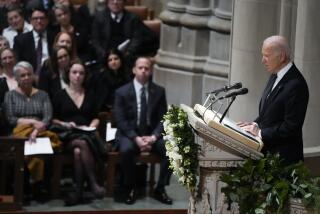O’Connor Praises U.S. Bench in Speech at Reagan Library
- Share via
SIMI VALLEY — Supreme Court Justice Sandra Day O’Connor called for the United States to continue efforts to make its judicial system a model for former Soviet bloc democracies that are struggling to reshape their own courts.
Speaking Tuesday evening to more than 300 people at the Ronald Reagan Presidential Library, O’Connor also agreed with one audience member’s observation that Americans file too many lawsuits.
“We [should] focus on things that I’m happy to see law schools focusing on--alternative systems of resolving disputes,” O’Connor said during a question and answer after following her address. “Don’t take every civil dispute to court. We have to learn how to negotiate, how to arbitrate, how to mediate.”
In a 30-minute speech, O’Connor wove a brief history of the U.S. judiciary together with the idea that the federal bench can be a model for Eastern European countries hammering out their own fledgling courts.
She praised former President Ronald Reagan for nominating her in 1981, and 378 other federal judges during two terms.
Before her appointment, O’Connor served as the assistant attorney general of Arizona, an Arizona state senator and Senate majority leader. She also served that state as a Superior Court judge in Maricopa County and a state Court of Appeals judge.
The impact of the Reagan bench “is immense,” O’Connor said, and “The power that federal judges wield is enormous.
“A single judge at any level . . . can declare an Act of Congress invalid, can enjoin the enforcement of a state statute or order a prisoner freed,” she said.
Although some pundits have tried to suggest that a political bias exists on the Supreme Court by citing justices’ voting records, O’Connor, who is considered a moderate conservative, said: “This sort of vote-counting is deceptive and, in my opinion, fruitless.”
The federal bench--more than half of which was appointed by Reagan--adheres to a philosophy of restraint rather than of chasing political agendas, she said. And the judiciary demonstrates to other nations that the courts can be powerful protectors of individual rights.
She noted that the American Bar Assn.’s Central Eastern European Law Initiative is tracking development of judicial systems in the emerging nations and offering advice. And she credited the U.S. government for the “impressive array of assistance” it is offering those countries.
Such work continues a long tradition of political dialogue the United States has had with Europe since our Constitution was written more than 200 years ago, the justice said.
More to Read
Sign up for Essential California
The most important California stories and recommendations in your inbox every morning.
You may occasionally receive promotional content from the Los Angeles Times.










